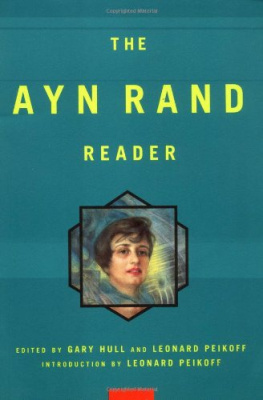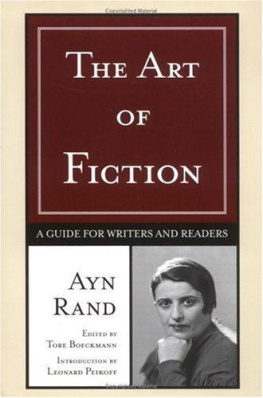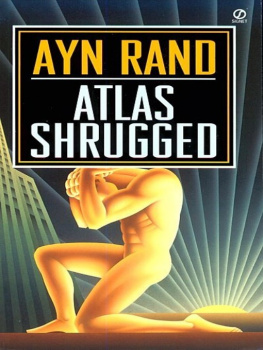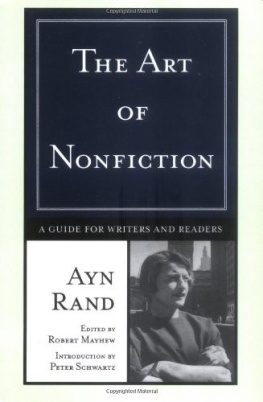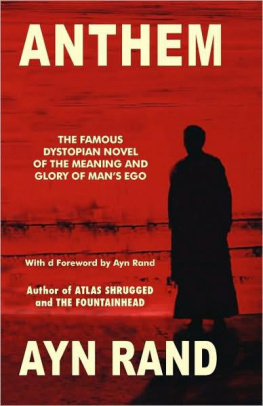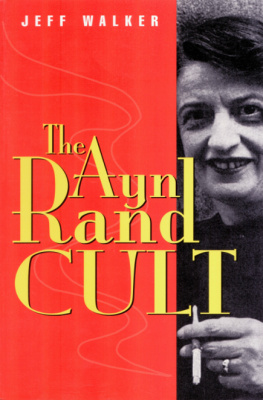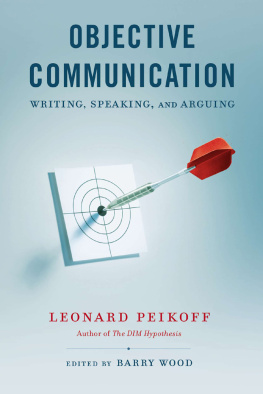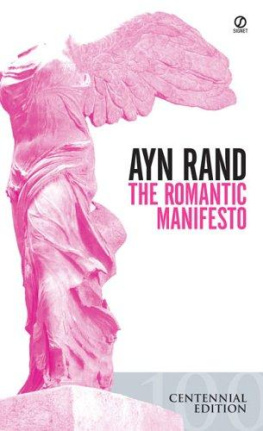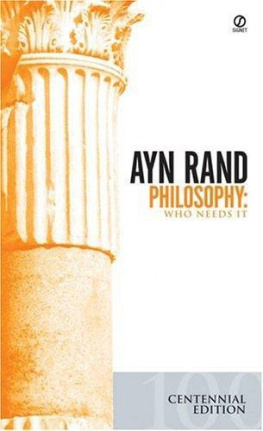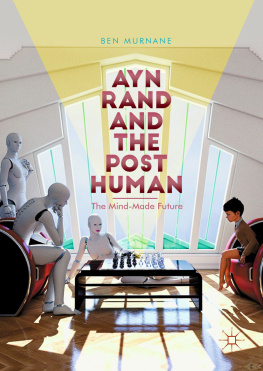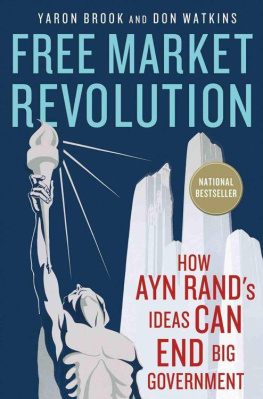Table of Contents
FROM AYN RANDS PHILOSOPHY OF RATIONAL SELF-INTEREST:
AMERICA: I can saynot as a patriotic bromide, but with full knowledge of the necessary metaphysical, epistemological, ethical, political and esthetic rootsthat the United States of America is the greatest, the noblest and, in its original founding principles, the only moral country in the history of the world. (Philosophy: Who Needs It)
CAPITALISM: When I say capitalism, I mean a full, pure, uncontrolled, unregulated laissez-faire capitalismwith a separation of state and economics, in the same way and for the same reasons as the separation of state and church.
(The Objectivist Ethics)
EMOTION: An emotion that clashes with your reason, an emotion that you cannot explain or control, is only the carcass of that stale thinking which you forbade your mind to revise. (Atlas Shrugged)
MORALITY: The purpose of morality is to teach you, not to suffer and die, but to enjoy yourself and live. (Atlas Shrugged)
DR. HARRY BINSWANGER, an associate of Ayn Rand, received his doctorate in philosophy from Columbia University. He taught philosophy for many years at Hunter College and gave courses on Ayn Rands philosophy, Objectivism, at The New School for Social Research in New York City. He is now editor of The Objectivist Forum, a magazine that applies Objectivism to philosophical and cultural issues.
THE WRITINGS OF AYN RAND


MERIDIAN
Published by the Penguin Group
Penguin Books USA Inc., 375 Hudson Street, New York, New York 10014, U.S.A.
Penguin Books Ltd, 27 Wrights Lane, London W8 STZ, England
Penguin Books Australia Ltd, Ringwood, Victoria, Australia
Penguin Books Canada Ltd, 10 Alcorn Avenue, Toronto, Ontario, Canada M4V 3B2
Penguin Books (N.Z.) Ltd, 182-190 Wairau Road, Auckland 10, New Zealand
Penguin Books Ltd, Registered Offices: Harmondsworth, Middlesex, England
Published by Meridian, an imprint of Dutton Signet, a division of Penguin Books USA Inc.
First Meridian Printing, January, 1988
Copyright 1986 by Harry Binswanger
Introduction copyright 1986 by Leonard Peikoft All rights reserved. For information address Dutton Signet.
ACKNOWLEDGMENTS
Excerpts from The Ominous Parallels, by Leonard Peikoff. Copyright 1982 by Leonard Peikoff. Reprinted with permission of Stein and Day Publishers.
Excerpts from The Romantic Manifesto, by Ayn Rand. Copyright 1971, by The Objectivist.
Excerpts from Atlas Shrugged, copyright 1957 by Ayn Rand, The Fountainhead, copyright 1943 by Ayn Rand, and The New Intellectual, copyright 1961 by Ayn Rand.
Excerpts from Philosophy: Who Needs It, by Ayn Rand. Copyright 1982 by Leonard Peikoff, Executor, Estate of Ayn Rand.
Excerpts from The Philosophy of Objectivism lecture series. Copyright 1976 by Leonard Peikoff.
Excerpts from Alvin Tofflers interview with Ayn Rand, which first appeared in Playboy magazine. Copyright Alvin Toffler 1964.

REGISTERED TRADEMARKMARCA REGISTRADA
Library of Congress Cataloging-in-Publication Data
Rand, Ayn.
The Ayn Rand lexicon.
Includes index.
1. Philosophy, I. Binswanger, Harry. II. Title.
III. Title: Objectivism from A to Z.
B945.R233A-15291
eISBN : 978-1-101-13724-6
BOOKS ARE AVAILABLE AT QUANTITY DISCOUNTS WHEN USED TO PROMOTE PRODUCIS OR SERVICES. FOR INFORMATION PLEASE WRITE TO PREMIUM MARKETING DIVISION, PENGUIN BOOKS USA INC., 375 HUDSON STREET, NEW YORK, NEW YORK 10014.
Information about other books by Ayn Rand and her philosophy,
Objectivism, may be obtained by writing to OBJECTIVISM, Box 177,
Murray Hill Station, New York, New York 10157, USA.
http://us.penguingroup.com
Introduction
AYN RAND WAS a philosopher in the classical sense: she was intent not on teasing apart some random sentences, but on defining a full system of thought, from epistemology to esthetics. Her writing, accordingly, is extensive, and the range of issues she covers enormousso much so that it is often difficult for a reader to know where in her many books and articles to look for a specific formulation or topic. Even Miss Rand herself was sometimes hard-pressed in this regard.
The Ayn Rand Lexicon solves this problem. It is a compilation of key statements from Ayn Rand (and from a few other authorized Objectivist texts) on several hundred alphabetized topics in philosophy and related fields. The book was initially conceived by Harry Binswanger, who undertook it during Miss Rands lifetime with her permission and approval.
Two different audiences can profit from the Lexicon. Those who know Miss Rands works will find it a comprehensive guide to the literature. It will enable them to locate topics or passages easily, andby virtue of its detailed indexes and cross-referencesto check on their wider context and ramifications. Newcomers to Ayn Rand will find the book an intriguing introduction to her thought, one eminently suited to browsing. Many such browsers, I venture to say, after sampling the entries under REASON, SELFISHNESS, CAPITALISM, and a few more such topics, will become hooked by the logic and originality of Ayn Rands ideas. If this happens to you, the next step is to turn to one of her books.
By its nature, this kind of project requires an editor with a professional knowledge of philosophy in general and of Ayn Rands philosophy, Objectivism, in particular. Harry Binswanger qualifies on both counts. He is a Ph.D. from Columbia University and taught philosophy for many years at Hunter College. Dr. Binswanger was an associate of Miss Rands. He taught Objectivism at the New School in New York City, and assisted in a course on the subject at the University of California (Berkeley). At present, Dr. Binswanger is editor of The Objectivist Forum, a magazine that applies Objectivism to philosophical and cultural issues.
In preparing the Lexicon, Dr. Binswanger has done a thorough and meticulous job. He has covered not only the familiar works of Ayn Rand, but also obscure and little-known sources. He has done the excerpting skillfully and accurately, always selecting essentials; as a result, the passages he offers are generally self-contained and self-intelligible. And he has arranged the material within a given topic in a logical sequence, each excerpt building on the earlier ones. If one reads straight through a topic, one will discover not a series of disconnected sentences, but a definite structure and development; this makes the reading even more illuminating and enjoyable.
The Lexicon is a welcome addition to the growing Ayn Rand Library, of which it is Volume IV. It is going to be extremely helpful to me personally, and I am happy to recommend it to anyone interested in the thought of Ayn Rand. She herself, I know, would have been pleased to see it become a reality.
Leonard Peikoff South Laguna, California January 1986
Editors Preface
THE philosophic WRITINGS of Ayn Rand and her associates have grown to include almost two thousand pages distributed among eight booksplus various lecture courses, newsletter articles, and pamphlets. Accordingly, I conceived the idea of creating a reference work, organized by topic, to function as an Objectivist dictionary or mini-encyclopedia.
I first proposed this idea to Ayn Rand in 1977. She was originally somewhat skeptical about its feasibility, being concerned as to whether her writings would lend themselves to the kind of excerpting that would be required. To sell her on the project, I wrote a detailed prospectus of the book and worked up a samplethe entries beginning with the letter N. She was favorably impressed with the results and gave me permission to go ahead. She commented extensively on several dozen entries, helping me to define appropriate standards for excerpting and topic selection.
Next page
